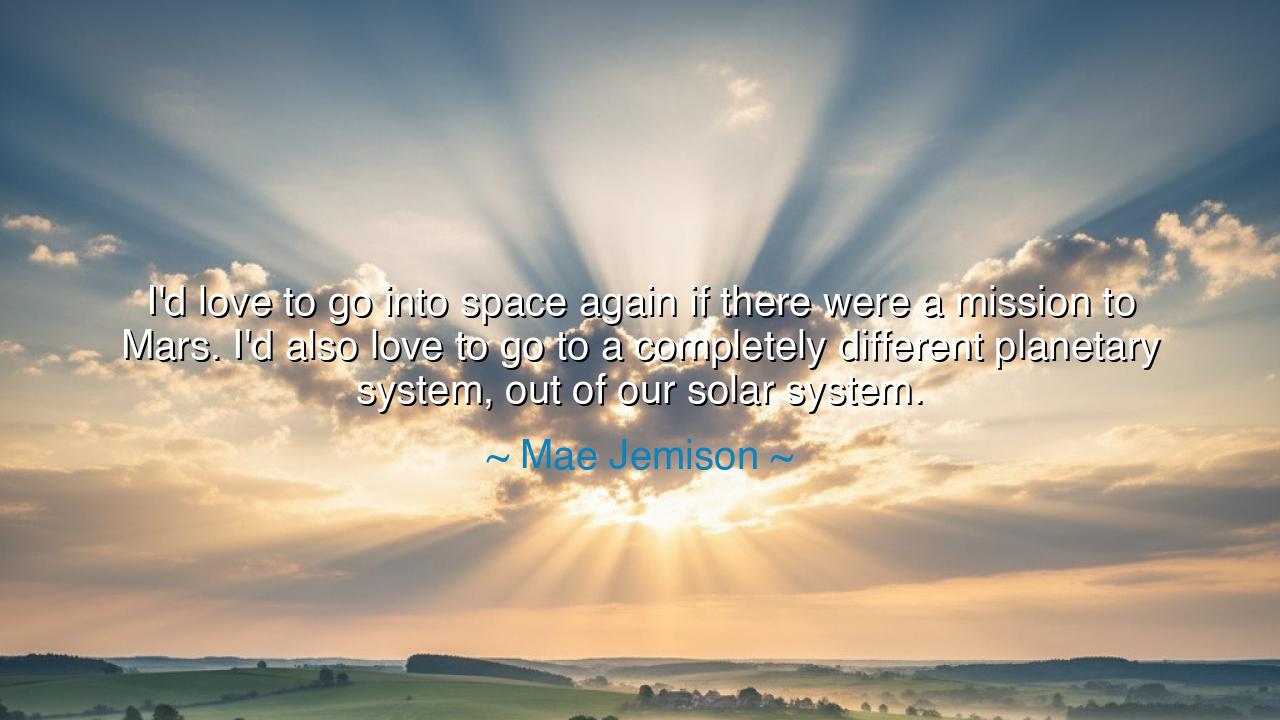
I'd love to go into space again if there were a mission to Mars.
I'd love to go into space again if there were a mission to Mars. I'd also love to go to a completely different planetary system, out of our solar system.






Hear, O children of the stars, the radiant words of Mae Jemison, pioneer and dreamer, who declared: “I’d love to go into space again if there were a mission to Mars. I’d also love to go to a completely different planetary system, out of our solar system.” In this utterance lies the eternal longing of the human soul—to journey ever beyond the horizon, to seek the unknown not for conquest alone, but for the joy of discovery. These words, though spoken by one who has already soared beyond the Earth, remind us that even the heavens do not satisfy the spirit’s hunger, for beyond each frontier lies another, beckoning with mystery and wonder.
The origin of this saying flows from Jemison’s life itself. She was the first African-American woman to travel into space, aboard the Space Shuttle Endeavour in 1992. But though she achieved what countless before her had only dreamed, she did not see her voyage as the culmination of human potential. To her, it was only the beginning. For the spirit that gazes upon Earth from orbit cannot be content to remain still—it must ask, “What lies beyond? What new worlds await? What might humanity become if it dares?” Her words are the echo of every explorer who ever gazed at an uncharted sea and yearned to cross it.
Consider the story of Ferdinand Magellan, who sailed west into waters no European had dared to traverse. Though he himself did not live to complete the journey, his fleet circumnavigated the globe, proving that the Earth was not an endless expanse but a sphere that could be known. In like manner, Jemison’s dream of voyaging to Mars or to another planetary system is not only about herself, but about all humanity. Her longing points the way, reminding us that we too must take up the mantle of exploration, even if the journey outlives our own lives.
There is also a deeper truth within her vision. To yearn for another solar system is to confess that humanity’s destiny cannot be confined to one world. Earth is our cradle, Mars our neighbor, but the stars are our inheritance. The human spirit was not made to rest within the limits of one sky, but to leap from star to star, learning, adapting, and carrying forward the spark of life. Jemison gives voice to this heroic vision: that one day men and women shall stand upon alien worlds, beneath suns not our own, and yet still call themselves children of Earth.
Yet her words are not merely dreams—they are also a summons. For to reach Mars or another planetary system requires discipline, sacrifice, and vision. It demands not only technology but courage, not only wealth but unity. The dream of space is not the possession of the few, but the work of the many. Just as the pyramids of Egypt were not raised by kings alone, but by thousands whose labor endured through centuries, so too the bridge to the stars must be built by a united humanity. Jemison’s voice calls us not to idle wonder, but to action.
Therefore, O listener, the lesson is clear: never cease to dream of horizons beyond your reach. Do not be content with what you have achieved, for beyond each victory lies a greater frontier. Let Jemison’s vision guide you—to see in the heavens not impossibility, but invitation. Her longing to voyage again into the unknown teaches us that greatness is not found in resting upon past triumphs, but in daring to rise again and again toward what lies beyond.
Practical action lies before you. In your own life, seek your Mars, your greater challenge that lies just out of reach. Do not grow complacent after success, but keep stretching toward the unknown. Nurture curiosity in yourself and in others, support endeavors that reach beyond the present, and live with a vision larger than your own span of years. For if you, too, can look up at the stars and whisper, “I long to go there,” then you will live with the same spirit that carried Jemison into orbit, and that will one day carry humanity across the galaxies.
So remember the teaching of Mae Jemison: even the stars that we reach cannot contain the hunger of the human heart. To step into space once is wondrous, but to yearn for Mars and for distant planetary systems is to embrace the destiny of humankind itself—to forever rise, to forever seek, to forever wander into the mystery of creation.






AAdministratorAdministrator
Welcome, honored guests. Please leave a comment, we will respond soon